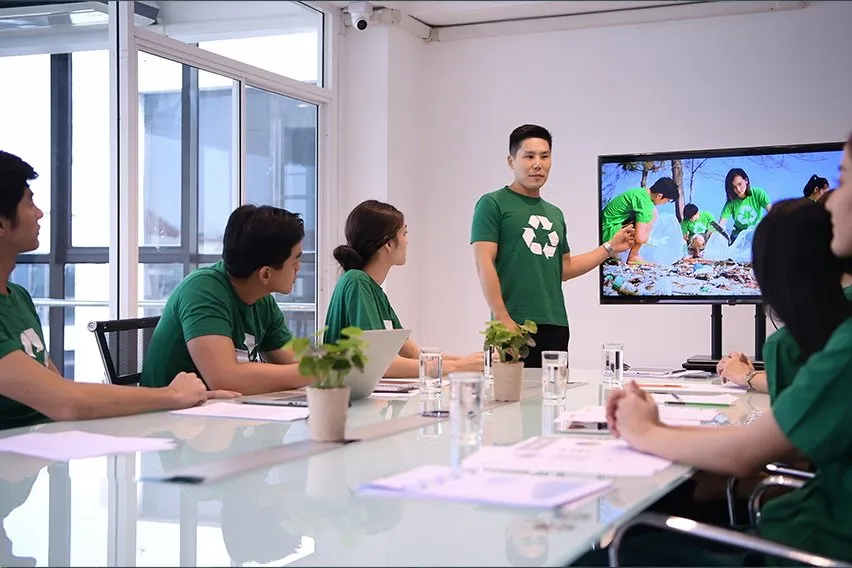How to Start a Business for Social Good

Our world has never been more connected, and neither has it ever felt more on the brink of change. With the internet and social media driving awareness for social and environmental issues, more and more people are looking for ways to make a positive social impact in their everyday lives.
These days, society’s commitment to doing social good influences everything from our careers to our purchases—and the influx of ethical brands has given us the ability to make a difference. These brands and companies, or social businesses, give us the opportunity to support our favorite causes by using our purchasing power.
So what is a social business? The Social Business Alliance defines it as: “Organizations that address a basic unmet need or solve a social problem through a market-driven approach.” A business that works for social good often seeks to find a balance between profit, sustainability and social impact. But while starting a small business to create social change is noble, it does take hard work to do the good you’ve set out to do.
Today, we’ll cover the basics of starting a social entrepreneurship, including finding your focus, researching it, implementing it and how to keep it going—and growing.
Find Your Focus
What is your company mission? Your cause should resonate with others but most importantly, it should resonate with you. To keep focused on your goals and stay motivated, it’s important to find a cause that you’re passionate about. You don’t have to look far to find inspiration—often the best business ideas come from looking at an everyday experience and thinking, “How can I make this better?”

Pinpoint the Problem
Instead of inventing a magical product to take the market by storm and finding a cause to fit it, study the experience you want to improve. Scrutinize it. Really think about every detail—pinpoint what about it you can fix, then brainstorm that solution further. How can you make it better for yourself and people like you? How can you take it a step farther and help other communities around you?
Having a clear social purpose is the foundation of all successful social enterprises and will give your passion a direction.
Start Small, But Think Big
A company like Ruby Cup is a great example of a social business that addresses both personal and environmental issues while helping the community. Silicone menstrual cups have become popular in recent years because they’re a sustainable alternative to disposable tampons and pads. They’re preferred because they’re cost-effective (a single cup eliminates buying tampons for over a year), reduce environmental waste, are more convenient to use and are better for your body.
You might think that’s already doing plenty for social good, but Ruby Cup does more by operating on a one-to-one business model. For every purchase, a cup is donated to a girl or woman without access to menstrual care products in developing countries. The company’s social mission also includes educational programs on reproductive health.
Your social business doesn’t need to hit all those points to make a positive impact. Just tackling one thing, like sustainability, is significant. But being focused doesn’t mean you can’t think of the bigger picture. A person who wants to help the environment by reducing waste and believes in empowering young women is a guaranteed loyal customer. People will feel good when supporting social enterprises that allow them to do all the above.
Being clear on what motivates you will help you structure your business and better help your community in the long run.
Research
Study the concept you’re tackling and learn the ins and outs of the industry you’re diving into. Whatever your social or environmental issue is, and however you want to solve it, research as much as you can to come up with the most effective solutions. If you’re looking to reduce plastic waste in the oceans by manufacturing reusable water bottles, look into how much waste you’d be reducing by putting your product out there. Get the numbers, understand the process and calculate your impact.
Brainstorming and Problem-Solving
During the brainstorming process, be prepared to troubleshoot and troubleshoot often. Always consider all possible angles about your product or service and how it can be improved. Returning to the menstrual cup example, think about how a person with disabilities might struggle using a conventional model.
Keela Cup is a brand that was inspired by that very issue. Its founder Jane Adame has Ehlers-Danlos syndrome, a connective-tissue disorder that makes people’s joints unstable, which means she could risk injury by inserting and removing a typical cup. So she collaborated with medical device designer Andy Miller to redesign the menstrual cup by adding a pull tab, making it more user-friendly and inclusive!
Basically, think about what consumers are looking for in a better solution and what else, apart from positive social impact, would concern them? Is it sustainability, aesthetics, convenience, affordability or all of the above? Market research is key. It’s important for social entrepreneurs to understand the problem they’re facing and the solutions already in place. It’s equally important that they understand their target audience.
Younger Consumers Expect Better
Recent surveys have shown that younger consumers, like the college-aged Gen Z, are more likely to support companies that embrace sustainability and ethical business practices, and have missions they care about. As the world becomes more socially conscious, more consumers expect businesses to give back to their communities in some way. In a lot of ways, social entrepreneurship is the desired default.
- In a retail and sustainability survey conducted in 2019 by CGS, nearly 70% of respondents said sustainability is at least “somewhat important” to them while over one-third said they’d be willing to pay 25% more for eco-friendly goods
- A study by Cone Communications indicated that 94% of the Gen Z individuals surveyed believe companies should help address critical social issues
- DoSomething Strategic learned that 76% of “young people” purchased or would consider purchasing a product to show support for the cause the brand supported
Embrace Diversity
As important as it is to surround yourself with like-minded teammates, make sure to embrace diversity. A diverse workforce means diverse ideas, approaches and perspectives. You’ll be better equipped to problem-solve from all angles and to keep up with a world that is becoming more inclusive by the day.
Think Globally
Even if your cause focuses on your local community, it pays to think globally. Utilize international resources, studies, events and meet-ups to build your network of social enterprises. Look to other social entrepreneurs like yourself for inspiration and direction—what makes their business model so successful, what communities are they collaborating with, who are they supporting? Who are the relevant innovators and social entrepreneurs worldwide? What can you learn from them?
Don’t be afraid to look beyond your industry and your community to find ways to improve your process.
Build Your Business Plan
Social entrepreneurship provides a structure for businesses to find success in the pursuit of helping others. A large part of that success comes from a strong business plan to support your mission. Even though making a profit is part of your goal, understanding how to efficiently manage a business will create a strong foundation to accomplish that, and the outreach you want to do.
Being passionate is great, but being organized and business-savvy will help you create a bigger social impact. Play to your unique strengths, knowledge and experiences to think creatively. All that will help you grow your business and spread its message farther in the long run.
So, where should you start? The three main things you have to consider are how to classify your organization, how to fund it and how to manage your finances.
Non-Profit or For-Profit?
Is your organization non-profit or for-profit? There are pros and cons to each but it’s important to decide which better suits your business and its goals. This determines the structure of your team, legal business, marketing strategy and more.
- Non-profit allows social businesses to accept grants, offer tax deductions to donors and receive tax-exempt status.
- For-profit social businesses, on the other hand, can accept equity investments and have no limits on revenue generation. However, they do have a limited ability to receive grants and can’t offer tax deductions to donors.
Put more simply: Both make money, but for-profits retain profit and non-profits put all profit back into maintaining the business. Traditionally, most social entrepreneurs opt for non-profit status.
Funding
You may not have the budget to jumpstart your social business from scratch, and that’s OK! Many grassroots organizations have humble beginnings. Chances are there are local businesses and events (like #GivingTuesday) you can get involved with to begin building professional relationships. A strong social media marketing campaign is your best friend from the start, especially when it works hand in hand with crowdfunding.
Crowdfunding is a popular and well-known method of funding a social entrepreneurship. There are several websites and approaches to crowdfunding, but the gist remains the same: Individuals or organizations invest or donate to projects, often in return for a potential profit or reward. Crowdfunding is a great option for supporting a social business since social media is the main platform for sharing information about social causes.
It also allows you to directly engage with, and get to know, your target market. We’ve discussed the different types of crowdfunding and how to choose the right one for your business here.
Fundraising and donations will make up most of your primary funds, and if your business holds a non-profit status, then you’re eligible for funding via grants as well. Other sources of income are product sales, sponsorships and corporate contributions. Find what works best for you and your social enterprise!
Balancing the Books
Starting a social enterprise means finding a balance between philanthropy and business management. When you’re a small business relying heavily on outside funding and donations with a focus on giving back to the community, it’s especially important to stay on top of your finances.
Using accounting software like FreshBooks will help you balance the books in an easy, fast and secure way. From managing invoices to generating financial reports to help you make smarter business choices, FreshBooks makes crunching numbers a breeze—which means you’ll spend less time tied up with accounting and more time on growing your company.

Listen and Connect
The people and community you want to help always come first. Reach out to them and listen to what they have to say. You’re offering a solution for an issue specific to those participating in and supporting your social business, so always be in tune with your consumers. This is where feedback comes in!
There are some key things to keep in mind when it comes to customer feedback:
- Reachability: Whether it’s through social media, email, phone call or a feedback form on your website, make it easy for customers to get in touch with you.
- Be personable: Some people will reach out and hear nothing from customer service and it feels like their complaint is being shot into the void. The best companies get in touch with their customers and let them know they’re being heard by someone who cares about what they have to say. This helps build relationships with your consumers too.
- Listen: Genuinely listen to a complaint or concern. Try to come to a solution together.
- Improve: Look for ways to improve your business or product based on the feedback you received.
How Can Feedback Help You?
K9 Carts is a wonderful example of a company that cares about its customers and the community they help—both human and canine. They provide fully adjustable wheelchairs for ailing dogs and as such, are diligent about customer feedback and communication. Since each wheelchair is made to a dog’s exact specifications, the team at K9 Carts works closely with pet owners to ensure a perfect fit.
Their attention to detail and excellent communication skills have earned them a glowing reputation and built strong relationships with their consumer base—who often give back by returning their used wheelchairs. These are then donated by the company to other dogs in need: Sustainable, and community-driven.
By directly addressing and implementing feedback—both positive and (especially) constructive—you show that your company is willing to grow and improve. It tells people that you care about the community and the cause you’re supporting.
In Conclusion
Every business has the ability to impact the world and inspire social change. Even if you aren’t looking to start a social enterprise from the ground up, you can implement any of these methods in order to give your existing company a social purpose.
At the end of the day, your customers need to know you’re there for them. Remember that people and your mission come first. Listen to their needs and address them head-on. Do your research, connect with the community and other like-minded businesses. By helping you manage your finances, FreshBooks makes starting a social business easy! After all, “profit” and “charity” don’t have to be mutually exclusive.
Be passionate, be creative, and most importantly, be smart.
Sign up with FreshBooks to start your 30-day free trial today, and upgrade to a plan that fits your needs. Visit the FreshBooks Pricing page for details.
RELATED ARTICLES

 20 Online Business Ideas: Which Internet Business Is in Most Demand?
20 Online Business Ideas: Which Internet Business Is in Most Demand? 10 Business Ideas with No Employees: How to Run a Business on Your Own
10 Business Ideas with No Employees: How to Run a Business on Your Own Business Ideas for New Graduates: 10 Industries to Look Into
Business Ideas for New Graduates: 10 Industries to Look Into Is My Business Idea Good Enough? Test It Before It Fails
Is My Business Idea Good Enough? Test It Before It Fails How to Start a Real Estate Business: A Blueprint for Getting Started
How to Start a Real Estate Business: A Blueprint for Getting Started How to Start a Photography Business
How to Start a Photography Business